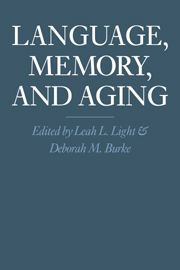Book contents
- Frontmatter
- Contents
- List of contributors
- Preface
- 1 Theories of information processing and theories of aging
- 2 Effects of aging on verbal abilities: Examination of the psychometric literature
- 3 Aging and individual differences in memory for written discourse
- 4 Geriatric psycholinguistics: Syntactic limitations of oral and written language
- 5 Aging and memory activation: The priming of semantic and episodic memories
- 6 Automatic and effortful semantic processes in old age: Experimental and naturalistic approaches
- 7 Integrating information from discourse: Do older adults show deficits?
- 8 Comprehension of pragmatic implications in young and older adults
- 9 Capacity theory and the processing of inferences
- 10 Age differences in memory for texts: Production deficiency or processing limitations?
- 11 Episodic memory and knowledge interactions across adulthood
- 12 The disorder of naming in Alzheimer's disease
- 13 Language and memory processing in senile dementia Alzheimer's type
- 14 Patterns of language and memory in old age
- Author index
- Subject index
12 - The disorder of naming in Alzheimer's disease
Published online by Cambridge University Press: 05 January 2012
- Frontmatter
- Contents
- List of contributors
- Preface
- 1 Theories of information processing and theories of aging
- 2 Effects of aging on verbal abilities: Examination of the psychometric literature
- 3 Aging and individual differences in memory for written discourse
- 4 Geriatric psycholinguistics: Syntactic limitations of oral and written language
- 5 Aging and memory activation: The priming of semantic and episodic memories
- 6 Automatic and effortful semantic processes in old age: Experimental and naturalistic approaches
- 7 Integrating information from discourse: Do older adults show deficits?
- 8 Comprehension of pragmatic implications in young and older adults
- 9 Capacity theory and the processing of inferences
- 10 Age differences in memory for texts: Production deficiency or processing limitations?
- 11 Episodic memory and knowledge interactions across adulthood
- 12 The disorder of naming in Alzheimer's disease
- 13 Language and memory processing in senile dementia Alzheimer's type
- 14 Patterns of language and memory in old age
- Author index
- Subject index
Summary
Alzheimer's disease is a degenerative disease of unknown etiology, the incidence of which increases with advancing age. Neurons are affected in many brain regions, but the distribution of degenerative changes is not random. The hippocampus and amygdala, which are known to be involved in learning, and areas of the frontal, temporal, and parietal lobes known to be involved in language and related processes are typically affected intensely by the pathological process of Alzheimer's disease (Brun & Englund, 1981). Disorders of memory and language are accordingly clinical features of the disease, which is characterized by an insidiously progressive dementia. Patients consistently develop an impairment of naming, or anomia, as a prominent feature of their language disorder. In this chapter, the general features of Alzheimer's disease are described, followed by a discussion of the language disorder, emphasizing research on anomia and its associated cognitive deficits. The chapter concludes with presentation of an experimental investigation in which an effort was made to establish the importance of a visual, semantic, and word-retrieval deficits in accounting for anomia in Alzheimer's disease.
Neuropathological features of Alzheimer's disease
Although a presumptive diagnosis of Alzheimer's disease can be made clinically (McKhann et al., 1984), the diagnosis can be made definitively only by histopathological examination. Abundant intracellular tangles of neurofilaments and extracellular plaques composed of degenerating neuronal cell processes and deposits of amyloid protein are diagnostic of Alzheimer's disease.
Information
- Type
- Chapter
- Information
- Language, Memory, and Aging , pp. 209 - 220Publisher: Cambridge University PressPrint publication year: 1988
Accessibility standard: Unknown
- 8
- Cited by
